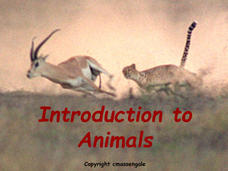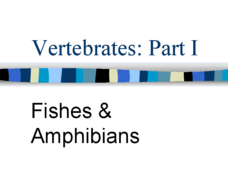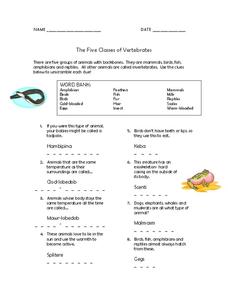K-State Research and Extensions
You Ol’ Fossil
Geologists are gneiss, tuff, and a little bit wacke. The fifth chapter of seven includes ten activities at four different levels. The hands-on activities cover fossils including how they are formed, vertebrates, invertebrates,...
Curated OER
Classification of Animals
This is one of the better presentations I've seen on the classification of animals. Youngsters view slides that introduce the characteristics of each of the animals groups through the use of photographs and text. Then, they are given...
American Museum of Natural History
Finding Fossils
How does one go about finding fossils? Find out with an informative webpage that looks at the digging process, showcases rocks and common fossils, helpful tips, and a list of archeological do's and don'ts.
American Museum of Natural History
Identification Adventure
Put all the pieces together. After a skeleton is put together, pupils play the scientist to determine the type of animal they have by using a classification tree to narrow down the identity. After each decision, they gain advice from an...
American Museum of Natural History
The Tree of Life
Groups of species can have more in common than meets the eye. An interactive cladogram shows some of the connections between important groups of species. Learners click on sections of the diagram to learn more about the connections or on...
Larson Lab
Animal Classification
How are animals classified? Scholars explore animal classification by observing non-living and living specimens. They learn how to organize animals into vertebrates and invertebrates and identify the five vertebrate groups: mammals,...
Biology Junction
Introduction to Animals
Out of all animals, elephants alone lack the ability to jump. Scholars learn all about animals using a presentation full of fun examples. It describes different types of animals, the biological similarities and differences between...
Howard Hughes Medical Institute
Vertebrate Circulatorium
When you get to the heart of the matter, you learn a lot about an organism by studying its circulatory system! A perfect resource for a zoology or anatomy class, the simulation gives users a peek inside a variety of vertebrates to...
Jude Mphoweh
Vertebrates and Invertebrates
Spine or no spine? Vertebrate or invertebrate? Learners sort and classify a list of animals as vertebrates or invertebrates into a graphic organizer.
NOAA
Vertebrates II
Mammals of the ocean unite! Or not. The 20th installment of a 23-part NOAA Enrichment in Marine sciences and Oceanography (NEMO) program investigates how warm-blooded marine mammals survive in water. In the class activity, learners use...
NOAA
Vertebrates I
I spy a spine. The 19th installment of a 23-part NOAA Enrichment in Marine sciences and Oceanography (NEMO) program explores vertebrate species, such as sharks and other fish. Learners take part in an activity evaluating the...
Virginia Department of Education
Animal Phyla and Plant Divisions
Searched hours for an activity that allows individuals the ability to use multiple resources to learn about both plant and animal kingdoms? This discussion and activity provide pupils with the ability to visualize each organism before...
Curated OER
Invertebrate Diversity
Comparative anatomy prevails in the lesson exploring diversity among invertebrates. Biologists examine physical characteristics of an earthworm from phylum annelida and a meal worm from phylum insecta. They also inspect a cricket and a...
Curated OER
Classification/Taxonomy/Statistics Review
"Does King Phillip Cry Over Flimsy Grass Stems?" You might not answer that question with this exhaustive worksheet, but your biology class will get the full scoop on the hierarchy of biological classification with this resource. It...
Curated OER
The Animal Body and How it Moves
Spark interest in the body structure of vertebrates with this comprehensive and colorful worksheet. Your biology class will explore the levels of organization, primary tissue types, and the main organ systems. Finally, they hone in on...
Curated OER
Vertebrates: Part I, Fishes & Amphibians
A simple set of slides shares the three classes of fish and the class amphibia. The first three slides cover fish characteristics and structure, while the last three cover amphibian characteristics and life cycle. Though somewhat...
Curated OER
Animal Classification
Second graders identify characteristics of and group animals by the five categories of vertebrates.
Curated OER
Technology Squares: Mammals
Review basic vocabulary related to mammals. This short quiz game allows students to test their skills and understanding of scientific vocabulary. This game is appropriate for grades 5-7 and covers very basic concepts.
Curated OER
Introduction to Animals
The details about invertebrates and invertebrates give valuable information about the characteristics of multicellular organisms. Examples of nutrition styles and symmetry are interesting. Also, these slides are clear in presenting a...
Curated OER
The Five Classes of Vertebrates
For this vertebrates classification worksheet, 5th graders unscramble 15 words to find answers to clues. Each clue gives information about the characteristics of vertebrates.
Curated OER
Classifying Vertebrates
Second graders study animal characteristics and classification. In this animal characteristics and classifications lesson, 2nd graders determine how to classify vertebrates which include mammals, reptiles, amphibians, birds, and fish....
Curated OER
Classification of Intertidal Organisma
Students categorize animals. In this animal classification lesson plan, students group animals by their characteristics. Students break into groups and work together to classify the animals. Students fill out a graphic organizer with...
Curated OER
So You Think You're Tough
Fourth graders learn how to classify animals. In this invertebrates lesson, 4th graders discuss how we classify thinks into groups and move into a discussion about classifying animals. Students learn about the differences between...
Curated OER
Life in a Forest Stream
Students assess macro-invertebrates from a stream. In this science lesson plan, students observe, classify and identify organisms found in a stream. A lab station is constructed at the stream sight and students study the different...

























